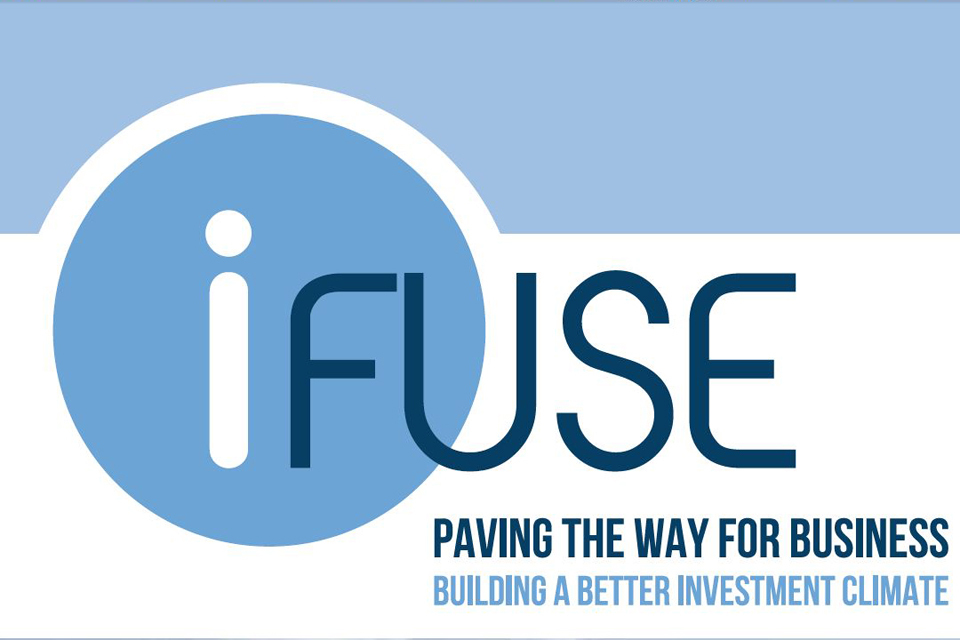The Investment Facility for Utilising UK Specialist Expertise (IFUSE)
Updated 13 April 2017

IFUSE logo
1. About IFUSE
The Investment Facility for Utilising UK Specialist Expertise (IFUSE) supplies specialist government-to-government expertise to support business environment improvement in DFID’s partner countries and regions, as well as other countries eligible for UK development assistance. IFUSE matches demand for support to business environment initiatives with advice and expertise from a broad range of UK government departments, agencies and related standards bodies in the form of short term, targeted deployments. It takes the burden of financing and organising the provision of expertise away from beneficiaries, DFID country offices and UK government, allowing experts and DFID partner country governments to concentrate on the key issues affecting their investment climate.
2. What form does IFUSE assistance take?
IFUSE assistance usually takes the form of an in-country deployment by an expert from the UK government, but the facility is designed to be flexible. This means that deployments can also take the form of visits to the UK by DFID partner country government personnel, virtual learning and knowledge sharing events and even desk-based reviews. IFUSE can also be used to support reviews of bigger DFID programmes where a wider perspective may be needed, or to help DFID and other donors develop a business case for a more sustained programme of support.
More detailed information on what IFUSE can help with and how it works in practice can be found in the IFUSE Brochure and the Frequently Asked Questions (FAQs) factsheet.
3. What expertise is available through IFUSE?
‘IFUSE currently works with 26 UK government departments, non-departmental bodies and standards institutions and the list is growing. You can find their profiles and a summary of the expertise they offer below.
4. Which countries and regions are covered by IFUSE?
The list is extensive and includes:
DFID partner countries:
Afghanistan, Bangladesh, Burma, DR Congo, Ethiopia, Ghana, India, Kenya, Kyrgyzstan, Liberia, Malawi, Mozambique, Nepal, Nigeria, Occupied Palestinian Territories, Pakistan, Rwanda, Sierra Leone, Somalia, South Africa, South Sudan, Sudan, Tajikistan, Tanzania, Uganda, Vietnam, Yemen, Zambia and Zimbabwe
Regional programmes:
Africa, Middle East and North Africa, Asia and the Caribbean
UK overseas territories eligible for development assistance:
Anguilla, Montserrat, Pitcairn, St Helena, Tristan da Cunha.
5. How has IFUSE supported investment climate reform so far?
Some examples of recent IFUSE deployments include the following countries and business environment issues:
5.1 Bangladesh
The Department for Business, Innovation and Skills (BIS) has supported DFID’s latest review of the $55 million Bangladesh Investment Climate Facility, set up to help create productive jobs by creating an environment conducive to investment.
5.2 Burma
UK Trade and Investment (UKTI) has facilitated roundtable discussions on foreign investment with Burmese MPs and political parties’ Central Executive Committees. More recently in Burma the Office of Fair Trading has provided advice to DFID on how to maintain healthy competition in the malaria pharmaceuticals market in the face of possible distortion by donor subsidies.
5.3 Ghana
The Government Actuary’s Department is working with the Ghanaian National Insurance Commission and GIZ on the development and delivery of effective microinsurance services for low-income people as part of a more robust insurance market.
5.4 Kenya, Kyrgyzstan, Mozambique, Nigeria and Tajikistan
IFUSE facilitated participation for delegates from these countries in the joint Better Regulation Delivery Office (BRDO) and World Bank conference in London on reforming the inspection climate to promote sustainable growth.
5.5 Liberia
BRDO has delivered 2 deployments to promote and implement risk-based business inspection models, providing practical support to improve the effectiveness of the inspection process and engaging business in the reform process.
5.6 Pakistan
Experts from the Office of Fair Trading (OFT) have trained the Competition Commission of Pakistan (CCP) on bid rigging in public procurement, advanced economic theories and merger analysis. IFUSE has also helped the CCP access world-class competition expertise at the OECD’s competition forum.
5.7 Tajikistan
Delegates from Tajikistan’s Land Registry Authority participated in the Land Registry and United Nations Economic Commission for Europe’s conference on how land registry offices can find solutions to the ongoing economic crisis affecting global property markets.
5.8 Tanzania
Experts from Her Majesty’s Revenue and Customs (HMRC) have provided sustained support to the Tanzania Revenue Authority by scoping the establishment taxpayer advocate service and redeveloping the Authority’s website, creating a more stable tax base and improving compliance with the country’s tax regime.
5.9 Vietnam
Infrastructure UK (IUK) has supported the Vietnam Public-Private Partnerships (PPP) Office to identify options for DFID support to PPP programming. This has contributed to the delivery of a clearer legal and institutional framework for the private sector to form PPPs with the government.
Please see The Civil Service Quarterly blog article profiling IFUSE and giving some illustrative examples of recent deployments.
6. How do I get support from IFUSE or find out more?
Contact the IFUSE team on:
Email: IFUSE@uk.pwc.com
Telephone: +44 (0) 20 7213 3005
IFUSE is managed by DFID’s appointed Managing Agent, PricewaterhouseCoopers LLP.
7. IFUSE quarterly reports
Quarterly reports for IFUSE are publicly available and are found below:
7.1 Year 1
October to December 2012 report
7.2 Year 2
October to December 2013 report
7.3 Year 3
October to December 2014 report
7.4 Year 4
October to December 2015 report
7.5 Year 5
October to December 2016 report
